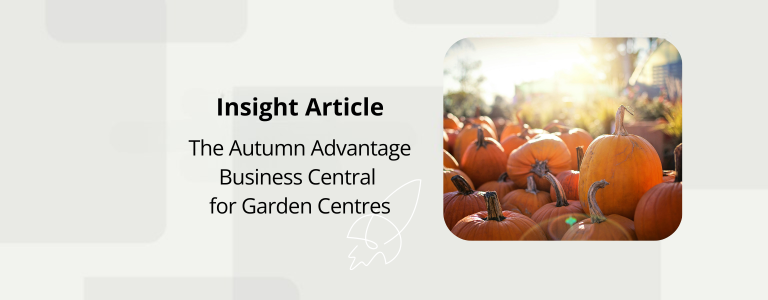The Autumn Advantage – Business Central for Garden Centres

Mark Channen

Autumn is one of the trickiest, but also one of the most opportunity-laden seasons for garden centres in the UK. As leaves turn and the weather becomes more unpredictable, buying habits shift: bulbs, hardy plants, garden furniture clearances, gifts, farm shop products, and cafés all play a larger role.
During Autumn, having a robust, integrated system like Microsoft Dynamics 365 Business Central is not just a nice to have, it can help garden centres stand out and boost that all important revenue.
Let’s take a look at the top 10 features & benefits of Business Central for garden centres this autumn.
The Garden Centre Landscape
The UK garden retail market is huge, with over 1,500 garden centres and retail nurseries competing for footfall across the country.
“Destination” attributes (cafés, giftware, experience, farm shops) are very important, as customers expect more than just plants.
Given that mix of garden centre choice and destination opportunity, garden centres that can be agile, insight-driven, efficient and highly customer-focused, stand to gain footfall, and that’s where Business Central comes in to help…
Top 10 Features & Benefits
Here are ten things Business Central does well, especially useful right now, along with how they map to the challenges garden centres face in autumn.
1. Unified Inventory & Stock Management
Helps you track plants, seasonal goods (such as bulbs), giftware, food products, garden furniture, all in one system; you can see what’s in stock, what’s aging, what needs reordering. This reduces overstock, reduces waste (plants perish!), and helps you respond quickly to weather-driven demand (e.g. a cold snap or early frost).
2. Demand Forecasting & Seasonal Planning
Using historical data and real-time trends, Business Central helps you forecast demand by product category. You can anticipate which bulbs, hardy plants or indoor plants will sell, plan for gift & Christmas lines, manage staffing etc. Autumn is historically a time when plant sales drop, but other sales (gifting, homewares, Christmas, food) pick up. Forecasting helps you shift focus.
3. E-commerce & Click & Collect Integration
More garden centres are selling online, using click & collect or home delivery. Business Central supports integrating online sales with in-store and garden centre POS. This ensures data flows, avoids double selling stock, gives visibility across channels. In autumn, customers may browse online when weather is bad, then collect or buy in person.
4. Retail POS Integration & Omnichannel Consistency
Business Central can integrate with POS in cafés, garden shops, giftware or event locations, so that pricing, discounts, loyalty, stock depletion etc. are consistent. This helps avoid customer frustration (“but I saw it cheaper online”) and helps you run promotions smoothly (e.g. autumn clearance, Christmas pre-sales).
5. Vendor & Supplier Management
Many garden centres deal with dozens of plant suppliers, growers, seasonal goods vendors, food & farm shop suppliers. Business Central gives tools for handling purchase orders, vendor performance, lead times. Given supply chain disruptions, knowing which suppliers reliably deliver, at what cost, and when, is vital.
6. Financial Management & Cost Control
With rising wage costs, energy bills, fuel & transport, garden centres need tight control of margins. Business Central gives real-time visibility into costs, profitability by department (plants vs giftware vs food vs café), helps with budgeting, cash flow forecasting. Autumn often has low plant sales, so food/café & giftware need to carry more weight; that shift needs good financial insight.
7. Analytics and Reporting
Dashboards & reports let you see what’s selling, what’s underperforming, what’s bringing footfall, what promotions worked or didn’t. You can benchmark items like average transaction value, cost per person
hour, etc. With this, you can make strategic decisions: which product lines to expand, which to discount early.
8. Customer Relationship Management & Loyalty
Autumn increases gifting, Christmas shopping, special events. A loyalty scheme tied into Business Central means you can track customer behaviour, push promotions tailored to past buyers (e.g. people who bought bulbs last year, indoor plants, gifts).
9. Workflow Automation & Process Streamlining
Automate routine tasks: reordering when stock drops below threshold, alerts when plants need special care, scheduling staff, automating financial approvals, etc. This reduces human error, frees up staff to focus on customer experience, especially important during busy periods or when weather is bad and staff availability may be impacted.
10. Scalability, Cloud & Remote Access
Business Central, being cloud-based ,means you can access key data from anywhere (home or on the go), which is helpful for senior management visiting sites, checking stock or sales whilst at off-site events or distribution. Also, as garden centres diversify (more food, more events, more gifting), the system can scale without needing many disconnected silos of software.
Why Autumn Is the Right Time
Shifting product mix: As garden/gardening categories often slump in autumn (e.g. plants, outdoor furniture), revenue leans more heavily on non-garden products (giftware, indoor plants, Christmas lines), cafés and food. A system that can handle many departments well and shift focus is a huge plus.
Weather risk & perishable inventory: Bulbs, plants etc. are weather sensitive. Being able to move stock quickly, discount strategically, avoid overstock or waste, is more important than ever.
Cash flow squeeze months ahead: Autumn & winter tend to be slower, but costs (labour, heat, light, rent) remain. Knowing where margins are thin, tracking costs tightly, planning expenditure (promotions, events, stock) helps avoid surprises.
Customer expectations rising: Customers expect online presence, click & collect, consistent promotions, loyalty programmes, good experiences across café and retail. Falling short here loses loyalty.
Competitive pressure: With some larger players restructuring, store closures (e.g. UK big garden centres have been closing underperforming stores) and consumers tightening budgets, differentiating on service, efficiency and customer experience matters.
A Few Compelling Scenarios
This is how garden centres might use Business Central this autumn:
Autumn Clearance Campaign: Real-time inventory visibility shows you have excess outdoor furniture, old stock of planters, or plants past their prime. Use Business Central to identify those items, coordinate mark-downs, push promotions via email/loyalty, and ensure POS and online discounts are consistent. This clears space, brings in cash to fund Christmas stock.
Bulb & Hardy Plant Forecasting: Using past years’ data (weather, sales) and current orders, forecast how many bulbs and hardy plants you need. Order from reliable vendors ahead of time, but only enough to match predicted demand and safety margin. Avoid overbuying which could lead to perishables going unsold.
Café & Catering Profit Push: Augment food & farm shop and café operations (which have been strong), maybe run autumn themed food events, seasonal menu items. Use Business Central to track food cost, vendor delivery, staff scheduling, integrate with POS so you know per item profit and which menu items are dragging down margins.
Christmas Early-Bird Planning: Many garden centres start rolling out Christmas sections in October. Using loyalty data, send early notices to loyal customers, use predictive analytics to stock home décor, lights, festive plants, gifts. Use integrated e-commerce andclick & collect, so that customers can buy online and pick up in store when shopping in person.
Managing Labour & Cost Pressures: With wage increases and rising overheads, schedule staff smartly, monitor labour cost vs sales by department, set alerts for overspend. Use remote access to keep tabs on things across multiple sites (if relevant).
Autumn in the garden centre world is not just about the change in season it’s about pivoting; It’s the moment when you lean into what works (gifting, food & drinks, home decor, experiences) and manage what’s fragile (plants, outdoor stock, weather-impacted categories). With the right tools, you can navigate the season profitably rather than being buffeted by costs, erratic demand, or forecasting errors.
Microsoft Dynamics 365 Business Central, by virtue of bringing together inventory, finance, operations, customer behaviour, suppliers and sales across channels, offers garden centres the ability to be nimble, efficient, data-driven; ready to delight customers no matter what the weather.
Fancy a demo?
Ask us for a 30-minute walk-through of the most relevant thing that will help your team achieve more. Get in-touch today for friendly advise from our expert team. Say hello here
-
Business Central




